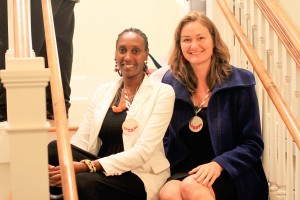
Elizabeth Scharpf is the Chief Instigating Officer at Sustainable Health Enterprises (SHE) and Julian Ingabire is the Chief Operating Officer of the organization. SHE’s main project currently is producing affordable maxi pads using banana fiber to make the core—typically the most expensive component. Through increasing education about menstruation and access to pads, SHE aims to give women who otherwise lack access to these a chance at increased productivity, opportunity and dignity. Because of their work, Schampf and Ingabire were awarded the Grinnell College Young Innovator for Social Justice Prize. The S&B’s Mariam Asaad interviewed Scharpf and Ingabire.
Can you tell me a little bit about what you guys do?
S: We invest in ideas and people that are overlooked, oftentimes taboo. Our first big initiative tackles menstruation. Specifically, we are hoping to have more affordable maxi pads and more accessible health and hygiene information for girls around the world. Right now, most of our operations are in Rwanda.
Why maxi pads instead of something like a menstrual cup?
I: In terms of the cultural practices of some of the societies that we’re working in … if you introduce [menstrual] cups or tampons, you’re already looking at a taboo topic, so those are some things that don’t work with the culture.
How has the product been faring.?
I: We’ve been testing the product in the market with end users. But selling the product is going to start in the next one month. So, we’re going to be distributing pads to about 3000 girls in 10 schools.
How big of an impact do you foresee, especially in terms of affordability?
I: We definitely see it having an impact on girls’ attendance in schools because there have been several studies that have shown that this is one of the reasons that girls tend to keep away from school. Besides the lack of information regarding menstruation and the fact that it’s a taboo, it’s also a lack of affordable products. Right now, in the Rwandan market, the cheapest Chinese brand is about one dollar and 50 cents, so we’re hoping to … have a packet of 10 sell for 50 cents. So, hopefully … [we’ll] increase affordability and access.
Can you tell me about deciding to go open source?
S: Well, the education and the content [will be open source], yes. Technology, we’re still figuring out the best way to partner on things. There [are] more smaller entrepreneurial folks that we’d like to partner [with], share as much as we can. Then, there [are] also the large companies that, if we partner with them, we’d like a royalty—we don’t want to be exploited.
Relatedly, how is SHE funded right now and what are you aiming for?
S: It’s all philanthropic so far, but [by] people that believe in a business model. So, we’re hoping to at least cover our operating expenses in Rwanda with revenue from that. And hopefully there are licensing opportunities. We’re also looking at other applications for banana fiber [and] producing a premium product to sell in other markets like the U.S.
How has this issue been received over the years?
I: From the time we started … nobody wanted to talk about it. As the years have gone by, most people have recognized that this is actually an issue in schools … so there’s been increased awareness about it. … Right now, I think there’s several movements that talk to menstruation; next year they’re approving a day for menstrual heath … so there’s really been lots of improvements, both on the national level and even internationally. …
When we started advocating for it in-country, we starting breaking the silence around menstruation and we solicited partnership and support of different organizations—women who are influential in the country and that helped a lot. For starters, at the time when we started, the government adopted a budget to start buying sanitary pads for girls in schools. They are now working on developing a school health plan, which is supposed to include menstrual education, and some of the schools, within formal settings like school clubs, do discuss things like menstruation.
How has Grinnell been for you guys so far?
I: It’s been busy and exhausting, but it’s nice. … It’s really lovely. We’ve had fun talking to different students, being asked questions that we hadn’t even thought of so far.



























































